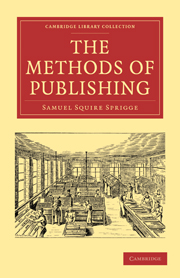Book contents
- Frontmatter
- Contents
- THE SOCIETY OF AUTHORS (INCORPORATED)
- PREFACE
- CHAPTER I LITERARY PROPERTY
- CHAPTER II THE VALUE OF ITS DIFFERENT FORMS
- CHAPTER III SALE, OUT-RIGHT AND LIMITED
- CHAPTER IV THE HALF-PROFIT SYSTEM
- CHAPTER V THE ROYALTY SYSTEM
- CHAPTER VI PUBLISHING ON COMMISSION
- CHAPTER VII ADVERTISEMENT
- CHAPTER VIII AUTHOR'S CORRECTIONS
- CHAPTER IX AGREEMENTS, MORE OR LESS
- CHAPTER X REMAINDER-SALES
- CHAPTER XI CONCLUDING REMARKS
- APPENDIX: THE SOCIETY OF AUTHORS. (INCORPORATED.)
- CONDITIONS OF MEMBERSHIP
CHAPTER IV - THE HALF-PROFIT SYSTEM
Published online by Cambridge University Press: 29 August 2010
- Frontmatter
- Contents
- THE SOCIETY OF AUTHORS (INCORPORATED)
- PREFACE
- CHAPTER I LITERARY PROPERTY
- CHAPTER II THE VALUE OF ITS DIFFERENT FORMS
- CHAPTER III SALE, OUT-RIGHT AND LIMITED
- CHAPTER IV THE HALF-PROFIT SYSTEM
- CHAPTER V THE ROYALTY SYSTEM
- CHAPTER VI PUBLISHING ON COMMISSION
- CHAPTER VII ADVERTISEMENT
- CHAPTER VIII AUTHOR'S CORRECTIONS
- CHAPTER IX AGREEMENTS, MORE OR LESS
- CHAPTER X REMAINDER-SALES
- CHAPTER XI CONCLUDING REMARKS
- APPENDIX: THE SOCIETY OF AUTHORS. (INCORPORATED.)
- CONDITIONS OF MEMBERSHIP
Summary
Concerning this system, Douglas Jerrold said that he liked it “because it never led to any division between author and publisher.”
This is the usual proposition. The publisher says to the author, “Give me your MS.; I will publish it without any risk to yourself, in a form creditable to my house, worthy of the work, and without delay. I will pay the whole or half the cost of production. I will give it proper advertisement. In return we will share all the profits.”
Nothing can at first sight seem simpler. The book trade is uncertain, for though there are sundry indications of the future value of a book, the profits of no book can be accurately estimated before it appears. The publisher, moreover, appears to be running great and unknown risks—the very word risk, conjures up an awful spectre before the author's eyes. As a matter of fact a publisher usually only offers to “ take the risk,” when he is very certain that there is none to take. The author, who is ignorant of this fact, with the recklessness towards literary property which we are always pointing out and reprobating, signs the agreement sent to him almost without reading it, if there be any agreement; or accepts the letter, if the proposal is by letter, or even agrees verbally, without the trouble of asking for so much as a letter. In each case he transfers his property to the publisher with a kind of shame, as if he were trespassing upon a stranger's good nature, not employing an agent to work for him.
- Type
- Chapter
- Information
- The Methods of Publishing , pp. 37 - 55Publisher: Cambridge University PressPrint publication year: 2010First published in: 1890

